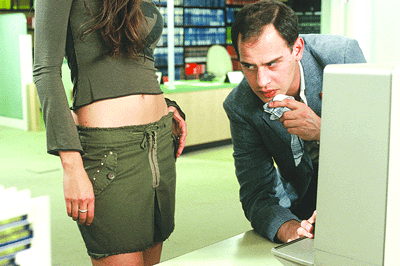Voyeurism, loathing, and self-delusion in Europe
People find ways to get through life, cope with its disappointments, and somehow muddle through it all. Some see things how they want it to be, not how it is. For Agnes and her two brothers, there seem to be no dearth of rose-colored glasses. Self-delusion and image control seem to be the default preferences for uptight legislator Werner and his sex-addicted librarian brother Hans-Jörg. The third brother, now a post-op woman named Agnes, seems far better adjusted.
There was a time that a transgendered brother would be the oddball twist, but in “Agnes and His Brothers,” the twist is that Agnes is the least erratic member of a family dealing with three generations of dysfunction.
Director Oskar Roehler shows simultaneous events in the parallel lives of the three brothers, which don’t often intersect. In some ways, it’s like watching three different movies, reflecting how our modern lives allow us to be—even keep us—separate from our closest relatives.
Werner (Herbert Knaup) lives in a beautiful home walled by high shrubs. It might be idyllic, but video award. In return, his wife Signe (Katja Reimann) and his son Ralf (Tom Schilling) treat him with open contempt, humiliating him at every turn. Signe thwarts his every romantic maneuver, while engaging in a creepy Oedipal relationship with Ralf, as they both laugh at Werner through most of the film.
Werner loves his family but dreams at night of shooting every one of them. Those leafy walls only cover so much.
Over at the library, brother Hans-Jörg (Moritiz Bleibtreu) lives life as if in a perpetual wet dream, gawking at the provocatively clad young women who come to him for reference help. Hans-Jörg is a sex addict and is far more interested in spying on these girls in the stacks and jerking off in an adjacent stall while peeping at girls on the toilet in the women’s room.
One woman, Nadine (Marie Zielcke), toys with the besotted librarian, coming on to him and playing a Tom Sawyer-like trick on him—while he paints her apartment, she’s off with the boyfriend she never broke up with, miles away. Hans-Jörg attends meetings for sex addicts, but incidents like these trigger violent outbursts. But he has a heart, too. When a fellow sex addict tearfully confesses to molesting his own dog, it is Hans-Jörg who shows him unequivocal support, and, referring to the dog, asks, “Did you cheat on her? At least you’re not committing rapes or trapped in an unhappy marriage!”
The dog, which is at the meeting, has a priceless expression during this exchange.
So, Roehler takes the audience from pathetic scenes of self-loathing and punishment at the hands of one’s nearest and dearest to hilarious justifications that oddly make sense in this particular universe.
In a visit to their eccentric father, Agnes maintains calm as Hans-Jörg claims Dad abused them, while Werner tells him to get over it, and exclaims that he is “normal,” never mind those dreams of shooting his wife and kids.
Agnes is trapped in a relationship that seems utterly and stereotypically traditional, given her transgender status. Her own live-in boyfriend expects dinner on the table and is constantly suspicious of Agnes’ nocturnal work life dancing at a local nightclub.
When the little tyrant kicks Agnes out, she makes do, finding shelter with a friend. Agnes never complains, and seems to be a real source of strength for Hans-Jörg and their father. When Agnes’ former lover, now a famous designer, comes to town, she dons a wedding dress and is determined to walk the red carpet with him.
What’s really interesting here is how Martin Weiss, with his angular, masculine face, is able to give Agnes a transcendent, Madonna-like feel—as in the Virgin Mary, not the singer. Agnes seems universally accepted and loved by her family, even the uptight Werner. Gender expression is basically not an issue here. The crux of the movie is that each sibling is forced to find a path to happiness that involves facing something none of them wants to confront.
“Agnes and His Sisters” is underscored by rock anthems pumping away as Werner and Hans-Jörg struggle to find love, understanding, and self-respect, as men. In one wonderful stalking scene, Hans-Jörg ‘s pursuit of a fruitless visual thrill is accompanied by the disjointed plucking of string instruments. Werner’s breakdown is accompanied by a gas-powered hedge-trimming chainsaw.
It’s easy to see why Agnes prefers a penis-free world where being pretty is her main goal; she is unburdened by the constant demands men put on themselves to prove something.
Agnes and her brothers will not make sense to many viewers—their choices sometimes make no sense; but to some degree, the compromises they make will provoke associations with people you know, even if they are not quite as intense and desperate. The things this family wants are simple, but the methods they use to get them are truly at the extreme.
gaycitynews.com


































